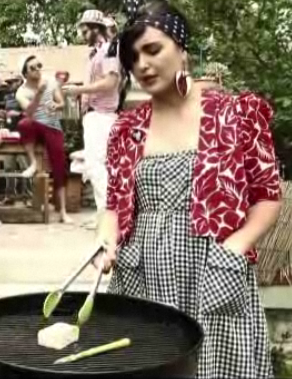Green Grilling Guidelines.
Summertime, and the smell of grillin’ is everywhere. If you want to join in the fun or host your own barbeque and not burn Mother Nature in the process, here’s how to make sure that your backyard bash is responsible. Just because you’re grilling out doesn’t mean you have to let your eco-consciousness go up in smoke.
Helpful hints to keep your barbeque tasting great while staying eco-friendly:
1) The disposable plates, cups and plastic ware that are used at backyard barbeques in the summer account for a massive amount of single-use waste…so try and avoid disposables all together. If you are unable to use real dinnerware and silverware, make sure you provide recycled, biodegradable or unbleached tableware for your guests. Companies like Biocorp or Verterra have some good biodegradable options.
2) Thinking of buying your Dad a new grill for father’s day? Make sure you’re smart about your grill options. Your carbon footprint depends greatly on the type of grill that you use to cook at you barbeque. Gas grills come out on top, from a carbon perspective, because propane and natural gas are most energy efficient, burning cleaner while leaving less waste behind. Charcoal grills, on the other hand, burn dirty: the briquettes burned contain carbon monoxide and other harsh chemicals. If you do use coal, look for organic or all-natural lump brands, like Rainforest Alliance Smartwood sustainably-harvested charcoal or Baha BBQ Fire Pack. Infrared grills are the greenest option: they heat quickly and use less energy and gas than your typical gas grill.
3) Watch out for toxic chemical use. Lighting up your grill to start cooking can be a difficult task, especially if you choose to go with charcoal. Stay away from lighter fluids—ditch ’em all. They hurt the environment and are harmful for everyone around the barbeque because they contain harmful VOCs. Better options: fire up your grill with electric charcoal starters, fire starters and charcoal chimineys. These alternatives give you a great fresh off-the-grill taste without exposing your guests to possible carcinogens or adding on to ground-level ozones. Also, some grill models are made of chrome-coated aluminum and can be toxic if the aluminum oxides, so look for cast iron or stainless steel grills.
4) Remember that big grills take a while to heat up, expending more energy. Don’t overdo the amount of food you buy: know your headcount beforehand and buy an appropriate amount of food. Grill with the lid down—it’s more energy efficient, and helps distribute heat thoroughly. Grill your meats at proper temperatures (avoid undercooking ground beef and poultry). By cooking more veggies than meat you limit your exposure to undercooking and will be less likely to be infected with bacteria. Vegetables also have a far lower carbon footprint. Be sure you buy local produce from organic and local farms, the farmer’s market or co-op.
5) If you make a mess, clean it up—without toxic “cleaners.”
Use a natural grill cleaner to scrub down your grill and maintain it after use. Start cleaning your grill while it’s still hot, with baking soda and a wire brush. Recycle, recycle, recycle: I know it may seem obvious, but to ensure efficient recycling, put out recycle bins accessible to guests and let them know you want to recycle any cans, bottles, and recyclable paperware. Separate your glass, plastic, and metal recyclable containers. Box up your leftovers in reusable storage containers. Gather the compostables and bring them to a compost heap or bin—you can compost charcoal remnants too.
For more, check out Planet Green.
Katie Feldhaus is a News & Editorial Journalism student at the University of Colorado at Boulder and is an editorial intern at elephantjournal.com. She is currently living in Boulder and is a Colorado native, who loves being active and doing anything outside.











Read 8 comments and reply